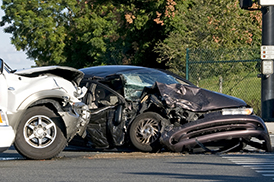Training Room 1
1. Training Room 1
1.4. Page 5
Training Room 1: Defining Workplace Safety Principles and Practices

George Doyle/Stockbyte/Thinkstock
You have learned about two types of controls used in the workplace: engineering and administrative controls. You also learned about WHMIS, an administrative control. This section covers the last line of control: personal protective equipment. By law, your employer must make sure that you, the worker, is trained in the “correct use, care, limitations and assigned maintenance of the personal protective equipment.” (© Government of Alberta, Occupational Health and Safety Code)
Personal Protective Equipment

Sometimes no amount of personal protective equipment would save the day. Want proof and a laugh? Search the Internet with these key words: “funny sport bloopers.” You might share what you find with your classmates.
Does wearing a seatbelt allow you to drive at 150 km/hr. while texting and be safe? Of course not. A seatbelt will contribute to your safety, but you still have to drive sensibly. It is the same with personal protective equipment (PPE). Wearing a hard hat, a respirator, goggles, or any other piece of PPE does not guarantee your safety. You still have to make the right decisions and work safely.
PPE is the last control measure used after everything else has been tried to reduce or eliminate hazards. PPE includes such things as hard hats, gloves, goggles, shields, glasses, aprons, coveralls, leggings, respirators, and fall protection. Wearing PPE reduces the chance of getting injured.
Watch Introduction to Personal Protective Equipment to find out how PPE can help protect you.
See if you can figure out which type of PPE protects which part of the body in Matching Game: Personal Protective Equipment.

